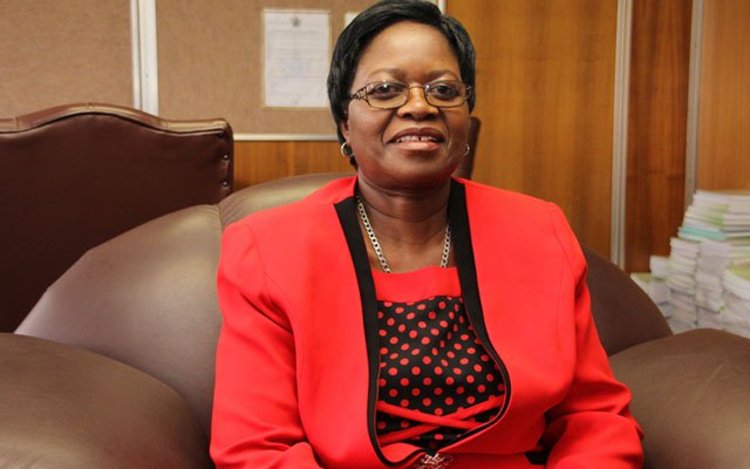Act decisively on AG’s reports


For the year 2016, the AG produced three damning reports which are decidedly depressing insofar as they are an indictment on deficient corporate governance in many Government departments and parastatals
Victoria Ruzvidzo In Focus
The name Mildred Chiri sends shivers down the spines of many, both physically and metaphorically. She is one woman with a real spine herself. She says it as she sees it. But have all her efforts to unearth poor corporate governance and corruption in public utilities have been futile? Many are of this persuasion.
“My duties as set out in the Constitution of Zimbabwe and amplified in the Audit Office Act (Chapter 22:18) are, in addition to examining, auditing and reporting on accounts of all persons entrusted with public monies or state property, to audit all institutions and agencies of Government and at the request of Government carry out special audits of the accounts of any statutory body or Government-controlled entity.
“I conducted my audit in accordance with the International Standards on Supreme Audit Institutions (ISSAIs) and the International Standards on Auditing (ISAs). Those standards require that I comply with ethical requirements and plan and perform audit to obtain reasonable assurance whether the financial statements are free from material misstatement.
“My audit approach was designed to enable me to express an opinion on the State enterprises and parastatals’ financial statements for the year ended December 31 2016,” reads part of an executive summary by Ms Chiri in her report on State enterprises and parastatals, one of the three reports she produced for the period.
The above words give confidence that her reports are not mickey mouse stuff or mere hearsay or fabrications, but are a result of international best practice and a desire by the AG to carry out her constitutional mandate to the full. You cannot fault her on this one.
Indeed the 2016 reports are pregnant with details of poor corporate governance instances, misallocation of resources and outright corruption.
But my qualms are that this has been something she has been doing expertly over the past 13 years since she took over the reins in 2004, but there is not much to show for her efforts in terms of holding those responsible to account.
She has been producing annual reports after thorough audits of how public resources are being used. Of course the common theme over the period has been huge financial irregularities that have prejudiced the economy of billions of dollars.
The health sector would be in better stead, infrastructure would be in place while many projects economy-wide would be up and running were the misuse of resources dealt with decisively.
Local authorities, parastatals, ministry officials and many other public figures and institutions have been caught repeatedly with their hands in the cookie jar and many have gotten away with it.
We applaud the Government for putting in place such a structure and process, where the Auditor-General (AG) operates freely in her discharge of duties, but the challenge comes on taking up leads and information from her reports to redress and resolve issues of resource misallocation and a flagrant disregard of proper governance systems as clearly stated in the audit reports.
We would want to believe that resources are expended during the exercise, hence we expect the reports to be taken more seriously and acted upon.
For the year 2016, the AG produced three damning reports which are decidedly depressing insofar as they are an indictment on deficient corporate governance in many Government departments and parastatals in an expose which further gives impetus to concomitant action being taken.
Audits are a basic function in any professional set up. Such reports of brazen and blatant acts of corruption, endemic acts of corporate sleaze and acts of startling mismanagement are exposed by the auditor-general have to be accorded the seriousness they deserve.
There are areas such as this one, where we have the systems and structures designed to stem haemorrhages and ensure that universally acknowledged and practiced principles of responsibility, accountability and transparency are operational, but what is evidently absent is the envisaged consequent and congruent action informed by the stellar work done by the AG to bring culprits to book.
Does it not become an exercise in futility when such reports assume mere cosmetic importance?
Pursuing an anti-corruption stance is integral to the President’s 10 Point Plan enunciated in his State of the Nation address in August 2015.
It would appear to all intents and purposes that those mandated to take it up and run with this directive are not sufficiently seized with the matter and are guilty of dereliction of duty.
I have mentioned in this column before that the culture of impunity perpetuates corruption and we cannot continue to be by-standers as we become as guilty as the culprits.
The AG is constitutionally mandated to shine the light on the financial management or mismanagement of public resources, a task she seems to be exhaustively executing.
The present state of our economy must imbue professionalism in virtually every facet in the conduct of business.
We can ill afford this shocking drain on our fiscus.
When the AG explicitly highlights such acts, does it not make it incumbent upon those with the investigative and arresting powers to take it up with a view of initiating prosecution and bring the issue to finality before the justice system
Early this week, the police categorically stated that they could not proceed with any case in the absence of a complainant.
Are our systems so fragmented? Don’t we have any administrative coherence at all? After such revelations, surely the subsequent steps should be seamless!
A story we carried a few days ago showed that institutions that are supposed to take action are not even sure of who must do what and at what stage.
Prof Madhuku said once the reports were tabled in Parliament, the police needed to move in but Senior Assistant Commissioner Charity Charamba said it was upon permanent secretaries, as accounting officers, to act.
“Those reports do not need to be verified or endorsed by Parliament. Once that report is tabled in Parliament, any organ of the State which has issues with what has been raised can act on it.
“It is a serious misunderstanding that there should be a complainant. The presentation of that report is sufficient notice to everyone, including the law enforcement agency. It is like saying there is a bombing somewhere, there is no need for a complainant in that case and the police are obliged to investigate that.” Said Prof Madhuku’
He views were also expressed by other lawyers. Chairperson of the Parliamentary Committee on Public Accounts Ms Paurina Mpariwa said after presentation of the AG’s report, they would submit a list of recommendations to relevant ministries for implementation.
“We give recommendations to relevant ministries and we expect the responsible minister to take action,” she said.
“We expect the ministers to come back and report on what they are doing to curb the leakages.
“Recently, Minister (Patrick) Chinamasa presented some of the measures that they are already implementing in the Ministry of Finance.
“Minister (Joseph) Made also said he is now ready with his presentation. If all ministries do that, the better for us. We will be doing a follow up to see if these ministries will be implementing what they have reported, starting with the 2016 report.”
But the question to ask is what does the portfolio committee do in instances where their recommendations are not acted upon?
This debate between the police, lawyers and the parliamentary portfolio committee illustrates the confusion over who should be doing what, while the scenario underscores the need for an urgent and clear-cut system that should be triggered automatically once such reports as the AG’s are out.
So much would be saved and protected in terms of resources if an efficient system was in place to deal with the issues.
President Mugabe has been quite vocal against corruption and it is about time that his voice was heard and decisive action taken to spare the economy from further degeneration.
In God I trust!







Comments